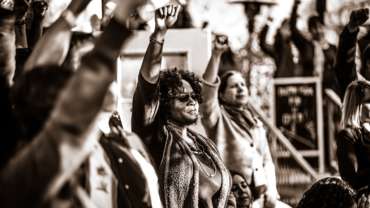The Church of the Messiah and Detroit’s Islandview community join the Turnout Sunday Campaign to increase African-American participation and representation in the 2020 Election.
February 7, 2020 | Robert D. Tompkins (Mr. Robert) | One Detroit Community Blogger
Black women have tried for years to increase representation and participation in politics and have mostly gone ignored. Some even say that they’ve created a detailed road map that supports an intentional investment in elected representation as a winning strategy.
In politics, we know that trust equates to investment in candidates’ development as well as in their campaigns. If you don’t trust them, you won’t donate or show up to their events. With increasing victories for black women politically, especially in Congress, there’s proof that these aspirants are worthy of future investment that closes the gap between black women’s political potential and their political power.
“Black women are the largest most active voting demographic. To not have representation of that on a 2020 election panel is blatantly ignoring their importance. It has nothing to do with ‘quotas’ but equal representation when discussing elections,” said Myya Jones, member of the Church of Messiah and former Detroit mayoral candidate.
“Black women have called out the nonsense from before the election, and one can only assume it’s because people want to retain their white privilege when they refuse to heed the advice,” said Ivy Nichole, CEO of Let’s Have Girl Talk.
During the 2016 election, Twitter was ablaze with commenters posting in unison that: “If you want to know the true state of this country, you need to listen to Black women.”
“When you look at the history of this country and its leadership, African-American women have been the backbone — we should be in the face of leadership also,” stated Rep. Barbara Lee, of California’s 13th District, in response to the role of Black women’s power in elections.
According to the Rutgers Center for American Women in Politics, “Women vote in higher numbers than men and have done so in every election since 1964. In 2016, 9.9 million more women than men voted. Women have voted at higher rates than men since 1980. In 2016, 63.3 percent of eligible female adults went to the polls, compared to 59.3 percent of eligible male adults. Even in midterm elections, when voter turnout is lower among men and women, women vote in higher numbers and at higher rates than men.”
More women than men register to vote. Some 83.8 million women were registered to vote in 2016, compared to 73.8 million men.
With the way this country and its leadership are responding to social ills, the Church of the Messiah partnered with Turnout Sunday, a campaign to energize the African American faith-based community to turn out at the polls in 2020.
The campaign was launched by Delta Sigma Theta Sorority, Inc. and AARP Michigan, in partnership with the Skinner Leadership Institute to address black voters through churches with the purpose of engaging them regularly on the importance of the election, what to expect to see on the ballot, location of polling places, and other pertinent information.
“Issues like Healthcare, Social Security, family care-giving, gun violence protections, prescription drugs, and financial security are all on the line in this election,” said Belinda Gilmore, Islandview resident. “Use your vote to hold your elected representatives accountable and make them pay attention to the issues that really matter to you.”
According to an Axios poll, Black voter turnout declined in 2016 for the first time in 20 years. And 13 percent of black male voters supported Donald Trump — over three times the rate of black women who did the same.
The Black community is being targeted by political parties as they’re realizing that the Black vote in some cases is up for grabs. According to Brando Starkey, staff writer for The Undefeated, black men are more likely than black women to stay home or cast a vote against their self-interest despite representing existing potential for individual candidates.
Black women have tried to unify this country behind values, policies and representatives that mutually cover us all. In this election cycle, it may be wise to hear them out or risk taking a further turn down a road with no return.
Featured Image: Black women leading the way, Photo by Johnny Silvercloud via flickr.com cc 2.0
Sources:
Dittmar, K. (2018, July 3). The Gender Gap in Voting: Setting the Record Straight. Retrieved January 14, 2020, from https://cawp.rutgers.edu/footnotes/gender-gap-voting-setting-record-straight.
McCammond, A. (2019, December 3). How 2020 Democrats are courting black men. Retrieved January 14, 2020, from https://www.axios.com/2020-democrats-focus-on-black-men-south-carolina-ahead-of-presidential-election-55c0a5ad-b826-407e-95c5-47ce64507b8f.html.
Starkey, B. (2016, December 16). Black people who didn’t vote let us down, too. Retrieved January 14, 2020, from https://theundefeated.com/features/black-people-who-didnt-vote-let-us-down-too/.
This article originally appeared here.

